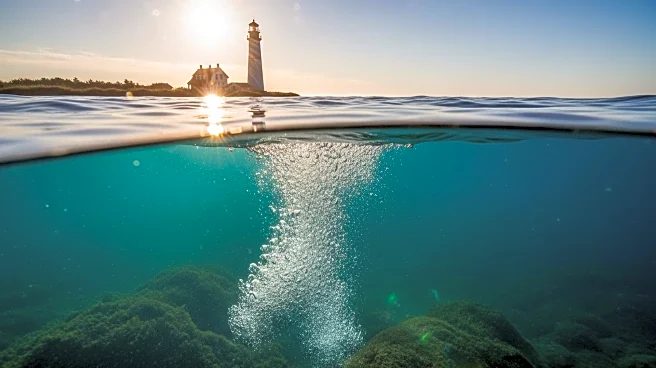What's Happening?
A groundbreaking scientific expedition, known as Expedition 501, has discovered a massive undersea aquifer containing fresh water off the coast of Cape Cod. This research, involving scientists from over a dozen countries and backed by the U.S. National Science Foundation, has identified a hidden aquifer that stretches from New Jersey to Maine. The discovery was made by drilling into the seabed and extracting thousands of samples, revealing fresh water in an area previously thought unlikely to contain such resources. The water's origins are being investigated to determine if it is from glacial ice melt or connected groundwater systems. This project marks the first systematic drilling mission aimed at finding freshwater beneath the ocean floor.
Why It's Important?
The discovery of this undersea aquifer is significant as it could provide a new source of fresh water amid growing global shortages. The United Nations predicts that by 2030, the demand for fresh water will exceed supply by 40%. This hidden aquifer could potentially supply water to a metropolis the size of New York City for centuries. However, challenges remain in terms of extraction, ownership, and environmental impact. The potential to tap into such resources could alleviate pressure on existing freshwater supplies, especially in regions facing severe droughts or where coastal freshwater sources are compromised by rising sea levels.
What's Next?
The next steps involve extensive analysis of the water samples to determine their age and safety for consumption. Researchers will assess whether the aquifer is a renewable resource and explore the feasibility of extraction without harming the environment. The findings could influence future water management policies and strategies, particularly in areas prone to water scarcity. The scientific community will continue to study the aquifer's potential, while policymakers and environmentalists will need to address the ethical and logistical challenges of utilizing this resource.
Beyond the Headlines
This discovery raises questions about the long-term sustainability of tapping undersea aquifers. Potential risks include the depletion of onshore water reserves and disruption of marine ecosystems. The project highlights the need for careful consideration of environmental impacts and the development of responsible extraction methods. As global water demands increase, such discoveries could shift the focus towards innovative solutions for water scarcity, prompting a reevaluation of how natural resources are managed and conserved.









